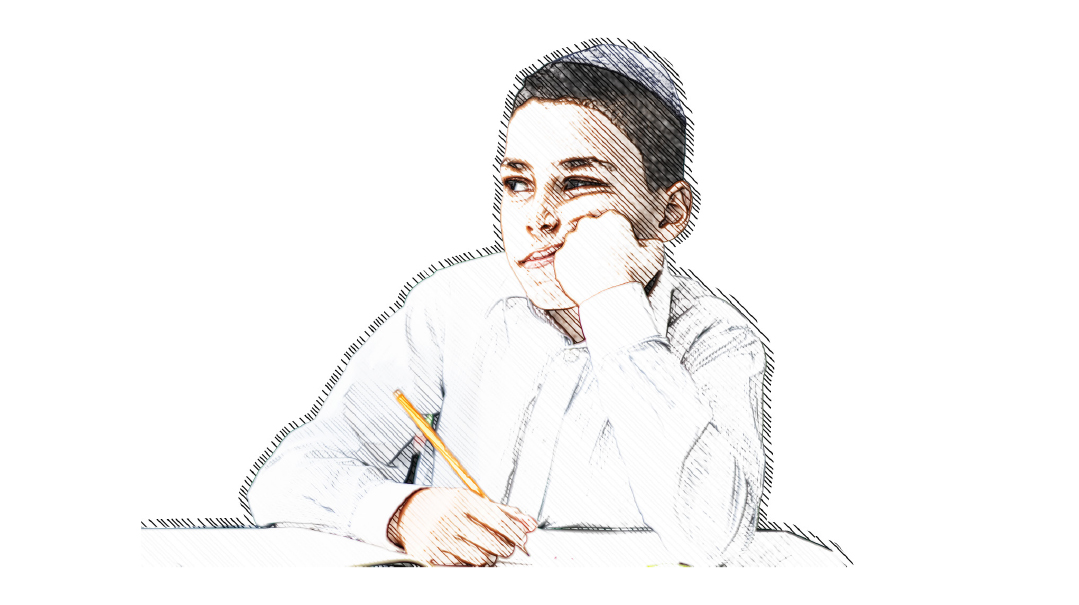Reattached
| November 1, 2022“If we educate parents about emotional awareness and availability at home, we can strengthen children from their core before any part of the system is able to hurt them”

Over the past few weeks, Project Makom director Allison Josephs has drawn significant and impassioned feedback to her piece, “Healing from Within,” about the correlation between OTD kids and emotional neglect. Wherever people stand on this issue, is there a way to re-parent even if unwitting mistakes were made? THE CONVERSATION CONTINUES
The reactions to my article “Healing from Within” [Issue 930] about how childhood emotional neglect (not being held, seen, heard, or unconditionally loved) causes insecure attachment — and how insecure attachment, coupled with some kind of trauma, are foundational reasons for why people leave observance — came fast and furious.
To recap the piece: According to psychologist Jasmin Lee Cori in her book The Emotionally Absent Mother, a child needs to hear and feel “good mother messages” in order to become securely attached. (To clarify, despite the “mother” terminology, the messages can and should come from the father as well.)
Some of those resonating messages are: I’m glad that you’re here. I see you. You are special to me. I respect you. I love you. Your needs are important to me. I am here for you (you can turn to me for help). You can rest in me. I’ll keep you safe. I delight in you.
I showed how all of those messages can be found in Jewish sources, as Hashem relates to us, His children. As we discovered in the Makom branch of our organization, Jew in the City, children who missed these messages are at a greater risk for going “off the derech.”
After I shared that discovery, many mental health professionals agreed with this take, and several parents told me they are now planning to do preventive work or heal the hurt they inadvertently caused their OTD children.
But there were other responses as well: Some parents told me that they felt blamed and judged, and that it was either some unresolved trauma, intellectual issues, or the system alone that failed their children.
Of course, I have not met every OTD Jew, but Makom has hundreds of members. And those “good mother messages” have triggered every OTD person I’ve shown them to, including those who initially insisted it was only “the system” that pushed them out.
Do all people who have insecure attachment and trauma wind up going OTD? Of course not. But nearly everyone I’ve worked with who went OTD seems to have had insecure attachment together with trauma as factors that pushed them out.
That’s because insecure attachment causes a person to be less resilient, so when traumatic events occur, he or she has less “fuel in the tank” to successfully face those events. Insecure attachment is the foundational issue that leaves a child rudderless, and trauma is often the final blow that ejects him or her from the frum world.
It’s also important to note that trauma and secure attachment aren’t binary phenomena. Both are sliding scales and full of uncontrollable variables, including such factors as birth order, sibling interaction, and the individual sensitivity of the child.
For years I’ve received two very different and distinct messages from people who went through “the system.” One side says, “You’re too positive about the state of the frum world, it’s much worse.” The other side says, “You’re too negative about the frum world, it’s much better.”
I didn’t mean to downplay the systemic issues within parts of the frum world that traumatize some children and need to be addressed and repaired. In fact, one branch of our organization (called Tikun) has been partnering with communal leaders to address systemic problems that our Makom members have brought to our attention over the years.
But while we undoubtedly have to fix some systemic issues — and that’s part of our ongoing work — I have found from personal experience that the most crucial piece of this puzzle is the attachment issue. If we educate parents about emotional awareness and availability at home, we can strengthen children from their core before any part of the system is able to hurt them.
What I’ve come to realize is that children can grow up going to the same schools and camps, and learning from the same kallah teachers, and still have vastly different experiences in those spaces.
One reason is that securely attached children have learned to filter out extreme and harmful messages and to ask questions at home. They have parents who will advocate for them if there’s a problem with school or something else. But most importantly, these parents have raised their children to feel loved and worthy — and they therefore learn to relate to Hashem in that way too.
It’s not only the “system” that gets blamed for pushing people out. OTD people have claimed to me for years that intellectual issues alone caused them to leave observance. But when I got to know these people more closely, that claim didn’t usually hold up. Yes, many people who leave the fold had their questions silenced or were fed simplistic and problematic Torah. But there is a wealth of high-quality, easily accessible information in the world today for those who seek answers. And even without perfect answers for every difficult question, numerous thinking frum people can live with questions and not lose their faith. So why do questions drive OTD Jews to the brink?
What we’ve seen is that while intellectual questions certainly need to be addressed, many people use intellectualism as an excuse to avoid the attachment wounds, which are so very painful to address. Numerous Makom members who have done the work healing their attachment wounds find the intellectual questions less troubling.
Another type of feedback I received after the publication of my piece was that of despair — parents felt overwhelmed being told that there was yet one more thing they were supposed to do to not emotionally harm their children or increase their chance of leaving observance. And I want to clarify that.
No one expects parents to be perfect. In fact, the ideal mother is actually “the good enough mother,” a term coined by British pediatrician and psychoanalyst Donald Winnicott in 1953. He observed thousands of babies and their mothers, and realized that babies and children actually benefit when their mothers fail them in manageable ways, because it helps them build self-reliance. In fact, he posited that mothers only need to meet their kids’ needs 30 to 40 percent of the time. The main thing is to be aware of what those needs are and be okay with yourself when you fall short, as we all do.
In my piece, I highlighted these messages because I wanted to give parents a map to reconnect to their children. While “inner child” work with a qualified therapist is one way to repair the hurt, a parent can actually re-parent an adult child to some degree and create new relationship pathways. Once the child can tap into his own pain, isolating those “good mother messages” he missed and that weigh on his heart, a therapist can devise a plan to help the child hear and feel those messages with parents who are willing to do this work.
If attachment wounds exist, they should be healed for the sake of healing, not in order to manipulate a child to return to observance. But when people do this healing, we’ve seen how many begin to relate to Judaism differently.
I helped mediate such an encounter for my friend (no longer a teenager but an adult in her thirties) and her parents, both of whom I’m close to, and the results have been lifechanging for both sides. In theory, an emotionally intelligent person who is close to both parties could mediate, but a therapist should be involved as well, and we consulted therapists all along the way.
This is how her story played out: a story of hope and change that I see as a model for many other parents facing similar dynamics.
My friend’s parents are good people who love their children, and I know it always bothered them that their daughter (my friend) had pulled away in her teen years. They still saw each other and spoke on the phone, but there was always an unspoken distance. And part of that distance was caused by my friend feeling like she never quite belonged in her family, and by extrapolation, that she never quite belonged in her religious Jewish identity. I asked my friend if I could tell her mother about her feelings, and she agreed that I could relay the information in a gentle way.
Hearing this kind of information from a child is terribly painful, especially when the parents worked hard to give their kids everything they could. Yet much to my surprise, my friend’s mother received the information bravely and willingly. She asked what she should do to make things better.
I told her about the “good mother messages” and which specific “good mother messages” triggered my friend. Then I suggested that they discuss those messages together.
My friend was nervous about speaking to her parents, but deep down she wanted to open the lines of honest communication. A few days later, she mustered the courage to start discussing what was troubling her. She told her parents that she felt she didn’t really know them, that they had hidden themselves from her. And because she didn’t see them, she hid herself from them — and then grew up feeling unseen.
In the midst of this conversation, she discovered that her parents had made a conscious decision to conceal their pre-frum past from her because they were ashamed of things they did. She explained how painful it was not knowing who they were or where they came from. She said she didn’t need to know every uncomfortable detail, but she needed to know the general trajectory of their lives. And then the parents began opening up and sharing in a way they never had before. The more they spoke, the more she felt comfortable to ask.
At one point, though, my friend’s father decided he had heard enough criticism and he told her it was time for her to grow up and get over it. Because my friend had gotten to an honest and vulnerable place in the conversation, she tapped into her inner teenage child who had never felt comfortable disagreeing with her parents. And what she found was that she had been living with pent-up rage for decades.
She started screaming at her parents, and while normally out-of-control anger is something we try to avoid, it was cathartic to finally express her feelings of anger openly. At first her parents ran off, scared of her extreme reaction. But as she simmered down, they returned. When her mom came over and asked if she could hug her, my friend said yes. My friend rested in her mother’s arms and cried and cried her eyes out. The experience was life-changing for all of them. A short while later, on her own, my friend told me she had begun seeing Hashem differently.
I was very moved when I heard how receptive her parents were and how successful their newfound communication had been. I wondered what she thought of me bringing up the idea of a Shabbos visit to her parents in which her needs were met.
At first she was scared to let herself even imagine, but she slowly started coming up with details: plenty of food, fluffy towels and linens, the house being warm, her parents taking her family out to dinner during the visit. Yes, she and her husband have more money than her parents do at this point, but she still longed to be nurtured by her parents in that very basic way.
With her permission, I communicated this information to her parents, and to their tremendous credit, they got to work to actualize the ideal visit. When it was over, it had exceeded all of their expectations. My friend felt seen and embraced and was able to bask in her parents’ warmth and generosity. And her parents got what they had been longing for — their daughter’s heart.
My friend has continued with her therapy, and even in moments of backsliding, she uses the opportunity to self-advocate, while her parents are able to validate her and commit to improving.
Not only is their relationship healthier than it’s ever been, my friend sees the religious dynamic so differently now. Previously, Judaism had always been the scapegoat at times when her attachment wounds and trauma stung. She’s still in therapy and is continuing to rebuild her relationship with her parents — and as her emotional attachment to them grows stronger and healthier, she no longer blames Judaism for her pain.
A couple of our Makom members expressed their feelings in writing, sharing their own vision for what this path to healing could look like. In closing, I want to share them with you. Here is what they wrote:
Mom and Dad, when you say, “I love you,” what I want to feel is, “I love who you are. You are a good person.” I want you to say, “You can come to me when you’re feeling hurt, because all feelings are okay.” I want you to say, “I’m here for you. You can rest in me.”
I want to feel that you’re glad that I’m here. I want you to encourage me to have my own opinions and think for myself. I want to know that I can come to different conclusions from yours, and I’ll still be worthy of your love. Even though I’m an adult now, I want to come to your house and be taken care of by you. I want you to make me feel comfortable being myself in your home.
I have grown into an adult who does all the things an adult should do. But inside I am still a little child pining for your connection.
Mom, and all the moms and dads out there, I don’t blame you. I am not even angry at you. I understand why you couldn’t provide my little heart with a home. I spent a lot of time and energy learning about your family of origin and I understand that what you grew up with did not allow you to provide and create the connection that my siblings and I craved.
Maybe it was your generation and the way people were not yet aware of what we know today about how important healthy attachment is for healthy development. Maybe your little heart bled, pining for its own home and you never found your own place. Raising children that way must have been very difficult.
Maybe I was a child who was extra. Extra sensitive. Extra intuitive. Extra active. And you didn’t know how to connect and parent the child who felt so unfamiliar, so unrecognizable.
I come to you today with the heart of the little one who you loved dearly and did your best to raise. I see that. I also see that what you couldn’t give me leaves me with a gaping wound today that I am working to heal.
If you are open to moving on and healing, there are many sources of guidance, mentoring, or therapy to help you learn more about healthy attachment. It is never too late. For adult children, it’s very nurturing to see a parent take real action to heal their own wounds or lack of knowledge.
I am not blaming you. I am here to let you know that although I am big and grown, my little heart is still open. I wish you could find what it takes to forgive yourself. I hope you can find your own wounds or lack of knowledge and heal and grow. I still want to attach to you today.
It’s never too late. I am your child forever.
(Originally featured in Mishpacha, Issue 934)
Oops! We could not locate your form.






